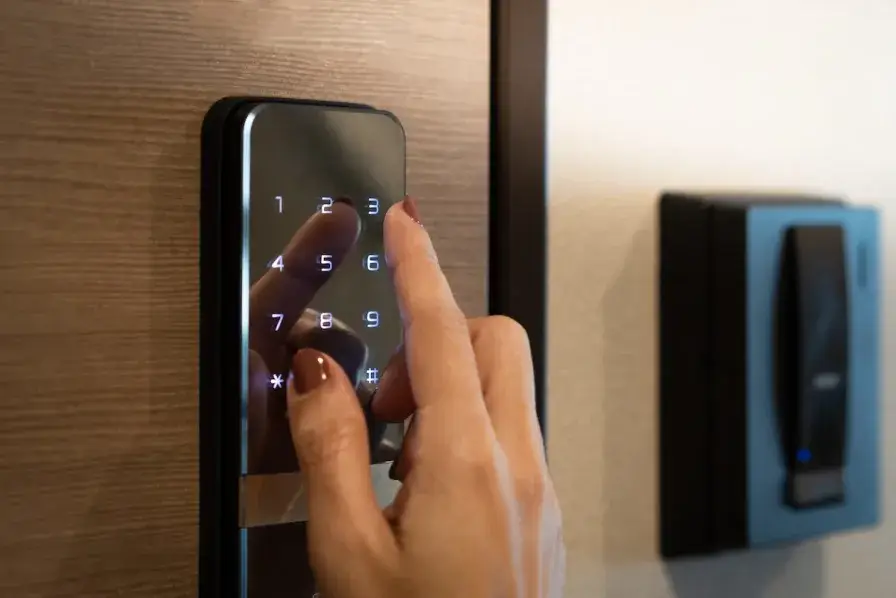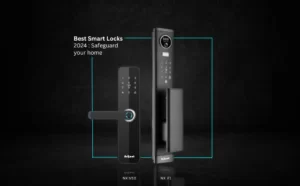Pros and Cons of Smart Locks
An Overview of Smart Locks
Smart locks are commonly referred to as keyless door locks because they don’t require actual keys to operate. These have locking systems that are comparable to standard conventional or deadbolt locks. The main distinction is that a smart lock has electrical parts that enable it to connect to Bluetooth, your home’s Wi-Fi network. As a result, you may control it using your smartphone or other smart home appliances. Because of such innovation in these smart locks, users prefer to know more about the pros and cons of smart locks to finalize their buying decision.
Depending on the design of the smart lock you select, it might have one or more of the locking techniques listed below:
- Individual numeric codes
- Using fingerprints
- A digital keychain
- Voice command
- Smartphone app management
Today in this blog we will discuss about pros and cons of smart locks.
Advantages of Smart Locks
While discussing the pros and cons of smart locks, let’s take a look at the pros section first.
• Easy access
You won’t need to search for your keys or wiggle the key in the lock to get it to open if you have a smart lock.
• Efficiency
You can enter unique codes with expiration times for each code if you’re planning on having visitors or hiring a house sitter while you’re away from home.
• Peace of mind
With a smart lock, you can keep a watch on your home right from your smartphone. You can know the time when a person enters your home. For instance, you can know when your maid entered the home and when she left.
• Security Against Break-ins
There is less chance of a break-in because some smart locks don’t have a key slot. Also, you will get a notification on your smartphone, if someone tries to tamper with the smart lock.
Enhanced Security Features of a Smart Lock
Smart lock security systems are a huge hit amongst modern-day homeowners because of their state-of-the-art technology and smart features. These smart locks can send messages on your smartphone if anyone tries to tamper with the lock. Its built-in sensors can detect forced entry and the encrypted technology ensures safe communication between the lock and the smartphone.
Also, smart locks like NEXMOT M10 save all the data within India and not on any Chinese app. This again enhances the security of users’ data.
Convenience and Keyless Entry
Keyless smart door locks have several benefits, one of which is their convenience. There isn’t much you can do if you lose your key with a typical lock and key. Smart locks connect to an app on your smartphone and turn it into a fingerprint door lock to unlock your door.
The absence of keys also lessens the possibility of a burglar or other crook breaking into your house. You can take full control of your home’s entrance by installing smart locks. A fantastic way to always feel safe and secure is to have complete control over who has entered your home.
Compatibility and Ecosystems of Smart Lock
When used in conjunction with other security measures, a smart lock can improve security, but it also has potential weaknesses. Before deciding whether a smart lock is appropriate, consider your security needs, level of technological comfort, and budget. Consider elements like stability, compatibility with your smart home ecosystem, and the degree of security you demand.
Smart locks make use of the Internet of Things (IoT)-enabled sensors to run keyless entry systems, like a fingerprint door lock, that let users open doors remotely using a smartphone or other internet-connected device. Smart locks allow owners to issue virtual keys to guests and allow door unlocking without a key from anywhere.
Remote Monitoring Capability
Remote monitoring, which enables you to monitor your home using a smartphone from anywhere on the globe, is one of the most recent advancements in home security. With the use of a smartphone app and a smart lock, you can lock and unlock your door from any location with an internet connection while also keeping track of how frequently your family and guests come and go.
Even if you are not physically present, you can grant access to others thanks to remote access features. You may send guests digital keys or generate temporary entry codes with only a few taps on your mobile device. These codes or keys may be time-restricted, guaranteeing that only a limited period of access is permitted.
Potential Drawbacks and Concerns of Smart Locks
Technology is wonderful when it functions properly, as people frequently and wisely acknowledge. But when things go wrong, they frequently end up questioning why they didn’t just stay with tried-and-true techniques.
Exposure to cyberattacks: As with any smart technology, hacking is a possibility. Although manufacturers of smart locks are continuously updating technology to stop this, it is still a possibility.
Technology dependency: Because they rely so much on technology, smart locks could have issues. Batteries may ultimately need to be changed, and certain smart locks’ hardware may eventually become outdated.
Higher upfront costs: Pricewise, smart technology is more expensive than the majority of conventional lock systems.
Smart Locks Battery Life and Backup
In case of damage, or other problems in your smartphone, you’ll need to get in touch with smart lock company to get a new smart lock code.
Although the use of this technology is expanding, not everyone is a fan of smart locks. Whether or not smart locks are the best choice for you, it’s crucial to understand that both their benefits and risks must be considered before choosing to install smart locks as opposed to regular locks.
Data Breach and Privacy Issues
The major drawback of the smart fingerprint door lock is hacking or a breach of privacy. Even though they make lockpicking less likely, hackers may nevertheless manage to get past the barrier and enter your home. They can target the lax digital security mechanisms on the lock to break into your network.
As with other IoT devices, you can spend money on a virtual private network (VPN). Setting up a VPN on your router will secure the connections of your smart lock or other devices, thanks to the new encryption technology. Even if thieves obtain your virtual key, they won’t be able to unlock your smart lock by decrypting it.
Hope from the above-mentioned information you now better know the pros and cons of smart locks and why it is better to buy such locks for enhanced security.
Conclusion
If you need to replace the standard key or deadbolt systems in your office or residential building, a smart lock may be the perfect replacement. Smart locks with cloud-based monitoring provide ease while maintaining security.
Although there are some pros and cons of smart locks, still this product is preferred by many customers in their smart homes.
Frequently Asked Questions
1. What is a smart lock, and how does it work?
A smart lock provides an advanced locking and unlocking facility, which you can manage remotely through your smartphone. These locks are connected to your home Wi-Fi network. These locks are more secure than traditional locks and are keyless. Although like any other product, there are some pros and cons of smart locks, but today, people prefer to buy these locks because of their greater advantages.
2. Are smart locks more secure than traditional locks?
Despite of pros and cons of smart locks, still smart locks are more secure than traditional locks, as there is no risk of losing the key. Also, you can keep a watch on these locks remotely through your smartphone.
3. What are the primary advantages of using a smart lock for home security?
Keyless entry, remote access, notifications on smartphones, and encrypted technology for more security are some of the primary advantages of smart locks which make them a preferred choice of smart homes.





Pingback: Tips To Improve Your Home Security | Tips By Nexmot
Pingback: Common Problems With Smart Locks - A Nexmot Study